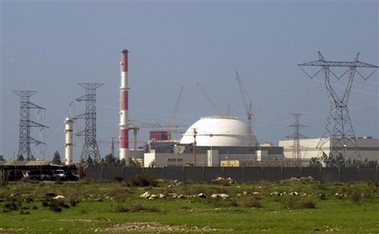Russia quitting Iran nuke project
(AP)Updated: 2007-03-21 08:39
VIENNA, Austria - Russia is bringing home its technicians and engineers from Iran's unfinished nuclear reactor site at a time of growing international pressure on Tehran to curb its atomic ambitions, US and European representatives said Tuesday.
 The reactor building of Iran's nuclear power plant is seen, at Bushehr, Iran, 750 miles (1,245 kilometers) south of the capital Tehran, in this Sunday, Feb. 27, 2005, file photo. [Reuters]  |
The representatives - a European diplomat and a US official - said a large number of Russian technicians, engineers and other specialists were flown to Moscow within the last week, around the time senior Russian and Iranian officials tried but failed to resolve differences over the nuclear reactor outside the southern city of Bushehr.
Russian officials deny links between the dispute over Bushehr and Iran's nuclear defiance. But two senior European officials, speaking separately, said Moscow recently dropped all pretexts and bluntly told Iran that Russia would not make good on pledges to deliver nuclear fuel for Bushehr unless Tehran complies with the UN demand for an enrichment freeze.
Asked about the approximately 2,000 Russian workers at Bushehr, the US official said: "A good number of them have left recently."
The European diplomat, who is accredited to the International Atomic Energy Agency, said a large number had departed last week, during abortive talks in Moscow between Russian Security Council head Igor Ivanov and Ali Hosseini Tash, Iran's deputy Security Council chief.
Sergei Novikov, a spokesman for Rosatom, Russia's Federal Nuclear Power Agency, confirmed the number of Russian workers at Bushehr had recently dwindled because of what he said were Iranian payment delays. He would not say how many had left.
The RIA Novosti news agency cited an unidentified representative for Atompstroyexport, the Russian contractor for Bushehr, as saying the fluctuation at the site was due to normal rotation. But the report cited the representative as saying that a "lack of financing on Tehran's part" could have led to more departures than new arrivals.
While formally linked to a financial row between Moscow and Tehran, the Russian departures are also connected to international efforts to persuade Iran to freeze activities related to enrichment, which can produce both nuclear fuel and the fissile material for atomic weapons.
One of the European officials said the dispute goes beyond the payment issue.
"Iran may not be paying, but that is not the relevant issue. The relevant issue is that the Russians are ... the supplier of the fuel, and today they made a very tough statement: We will not be delivering the fuel until you comply with the United Nations Security Council resolution," said the official, who is a senior diplomat.
The official noted the dispute was revealed on the same day that the resolution neared completion at the UN He suggested the timing was not by chance, and said the dispute may make it more difficult for some countries to side with Iran.
The diplomats and officials spoke to The Associated Press on condition of anonymity because their information was confidential.
The reactor is 95 percent completed, although eight years behind schedule. But Russia said this month that further work on the $1 billion project would be delayed because Iran had failed to make monthly payments since January. It said the delay could cause "irreversible" damage to the project.
Russia also indefinitely put off delivery of enriched uranium fuel it had promised to provide Iran by this month.
Iran, which denies falling behind in payments, was furious and was convinced that Russia - which has long blunted a US-led push for harsh UN sanctions against Tehran - was using the claim of financial arrears as a pretext to increase pressure for Iran to heed the council.
Iranian state TV on Tuesday for the first time described Russia as an "unreliable partner," adding: "It is clear that Russia has stopped construction of this plant under pressure and for political reasons."
John Bolton, the former US ambassador to the United Nations, said that for
more than four years, the US has "repeatedly asked the Russians not to ship fuel
to the Bushehr reactor until it became clear what Iran was up to."
| 1 | 2 |  |
|
||
|
||
|
|